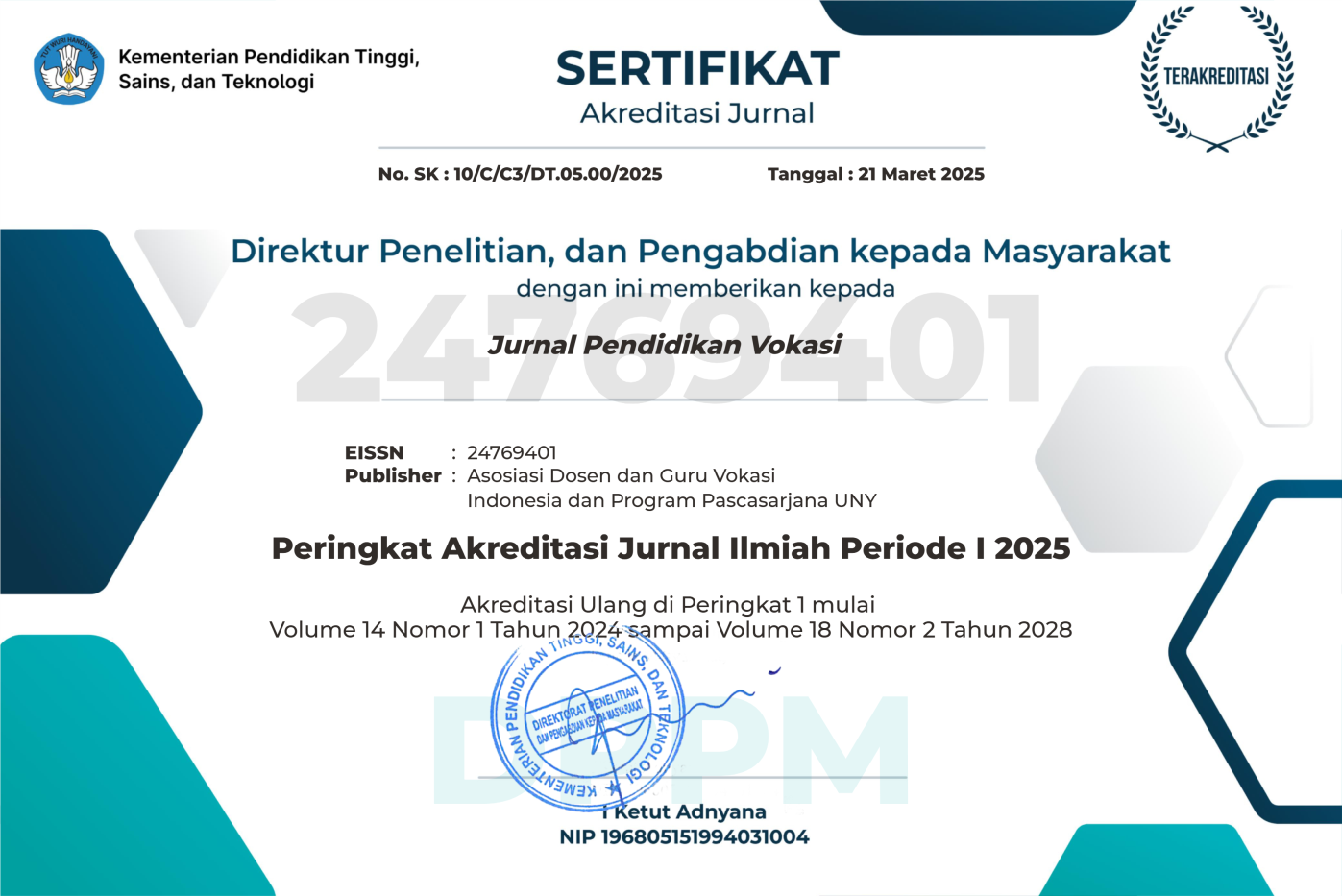Determinan pembentuk keluarga sejahtera bagi keluarga miskin pedesaan di Kabupaten Wonosobo yang berbasis industri kreatif pangan
DOI:
https://doi.org/10.21831/jpv.v6i3.11439Keywords:
pendidikan, kesejahteraan keluarga, industri kreatif pangan, keluarga miskinAbstract
Kata kunci: pendidikan, kesejahteraan keluarga; industri kreatif pangan; keluarga miskin
DETERMINANT FACTORS FOR ESTABLISHING PROSPEROUS FAMILY FOR RURAL POOR IN WONOSOBO REGENCY BASED ON CREATIVE FOOD INDUSTRY
Abstract
This study aim to describetheng level of understanding of the definition of both prosperous family and food creative industry among poor family, to find out the determinant factors for the establishing prosperous family based on creative food industry, and to identifyand analyse the needs of the poor family. This study adopted a descriptiv approach as the basis for the analysis in the research and development. The data were collected through FGD activities. The research sites were the two poorest villages in Wonosoboregency. The subjects consisted of 61 poor families.The results of the study show that the level of understanding of the definition of both prosperous family and food creative industry is categorized as fair. Additionally, the main determinant factor for establishing prosperous family is religious motives and the main determinant factor for establishing business activities to support livelihood needs through food creative industry is by joining trainings on food processing.Also, the vital components for establishing prosperous family and to establish business activities to earn income through food creative industry include:education, family welfare; intra and interfamily relationship; the role of parents for the children's education; family economy management; physical and spiritual security, healthy life planning; and development of food creative industry.
Keywords: education; family welfare; food creative industry; poor familyReferences
Alma, B. (2001). Kewirausahaan. Bandung: CV Alfabeta.
Badan Ketahanan Pangan dan Pelaksana Penyuluhan. (2016). Meningkatkan kemampuan para wanita tani melalui pelatihan pengolahan pangan okal. Retrieved from http://bkppp.bantulkab.go.id/berita/231- meningkatkan-kemampuan-para-wanita-tani-melalui-pelatihan- pengolahan-pangan-lokal
BPS Provinsi Jawa Tengah. (2011). Profil kemiskinan di provinsi Jawa Tengah.
BPS Provinsi Jawa Tengah. (2012). Profil kemiskinan di provinsi Jawa Tengah.
BPS Provinsi Jawa Tengah. (2013). Profil kemiskinan di provinsi jawa tengah.
Carroll, A. B. (1991). The pyramid of corporate social responsibility: Toward the moral management of organizational stakeholders. Business Horizons, 34(4), 39–48. http://dx.doi.org/10.1016/0007-6813(91)90005-G
Departemen Perdagangan RI, 2008:p. vii
Direktori FIle UPI. (2013). Kumpulan silabus UPI. Bandung: Universitas Pendidikan Indonesia.
Kuswardinah, A. (2008). Meningkatkan pengetahuan pramuwisma sebagai upaya peran ganti pola asuh anak bagi wanita karir di kota semarang. Laporan Hasil Penelitian Universitas Negeri Semarang.
Kuswardinah, A. (2009). Ilmu kesejahteraan keluarga. Semarang: UNNES Pers.
Kuswardinah, A., Ansori, M., & Rakhmawati, R. (2007). Pemberdayaan kelompok wanita tani sebagai tindakan preventif KKP anak balita dan usia sekolah di kabupaten semarang. Laporan Penelitian Universitas Negeri Semarang. Retrieved from http://elib.pdii.lipi.go.id/katalog/index.p hp/searchkatalog/byId/52298
Kuswardinah, A., & Kariada, N. (2011). Model pemberdayaan anggota PKK sebagai upaya meningkatkan pendapatan keluarga bagi masyarakat Deliksari Kodya Semarang. Laporan Hasil Penelitian Universitas Negeri Semarang.
Pangestu, M. E. (2008). Pengembangan ekonomi kreatif indonesia 2025. Jakarta: Departemen Perdagangan RI.
Peraturan Pemerintah No 21 Tahun 1994 tentang Penyelenggaraan pembangunan keluarga sejahtera. Republik Indonesia.
Rifai, M. S. S. (2007). Modul kuliah pendidikan kesejahteraan keluarga. Bandung: Jurusan PKK FPTK UPI.
Rosida, N. (2014). Peranan orang tua dalam mendidik anak. Kompasiana. Retrieved from http://www.kompasiana.com/nanikrosida/peranan-orang-tua-dalam-mendidik- anak_54f7ffbda333119d1c8b4de3
Semiawan, C. (2010). Kreativitas keberbakatan: mengapa, apa, dan bagaimana. Jakarta: Indels.
Sochib, M. (2000). Pola asuh orang tua: untuk membantu anak mengembangkan disiplin diri. Jakarta: Rineka Cipta.
Syuhud, A. F. (2012). Menuju kebangkitan islam dengan pendidikan. Jakarta: Pustaka Alkhoirot.
Walliman, N. (2011). Research methods: the basic. London And New York: Routledge.
Wildensyah, I. (2015). Ekonomi sumberdaya dan lingkungan dalam konsep pembangunan berkelanjutan. Kompasiana. Retrieved from http://www.kompasiana.com/wildensya h/ekonomi-sumberdaya-dan-lingkungan-dalam-konsep-pembangunan-berkelanjutan_563c90006323bd2f0894 98f4
Downloads
Published
How to Cite
Issue
Section
Citation Check
License
The authors submitting a manuscript to this journal agree that, if accepted for publication, copyright publishing of the submission shall be assigned to Jurnal Pendidikan Vokasi. However, even though the journal asks for a copyright transfer, the authors retain (or are granted back) significant scholarly rights.
The copyright transfer agreement form can be downloaded here: [JPV Copyright Transfer Agreement Form]
The copyright form should be signed originally and sent to the Editorial Office through email to jpvokasi@uny.ac.id
Jurnal Pendidikan Vokasi by http://journal.uny.ac.id/index.php/jpv is licensed under a Creative Commons Attribution-ShareAlike 4.0 International License.












